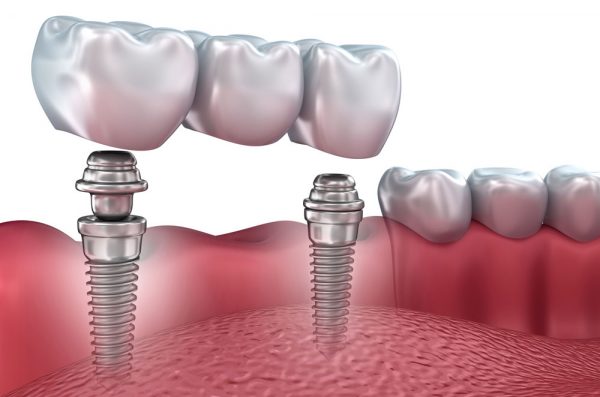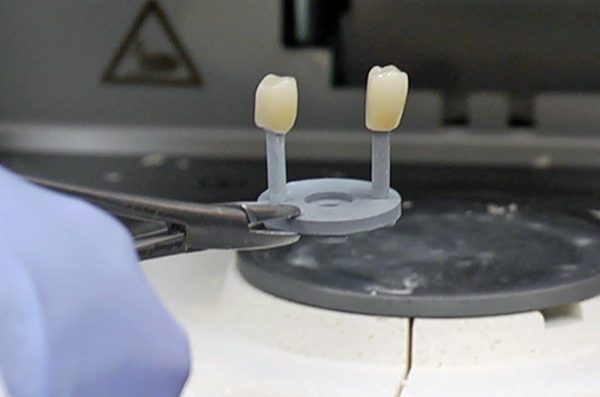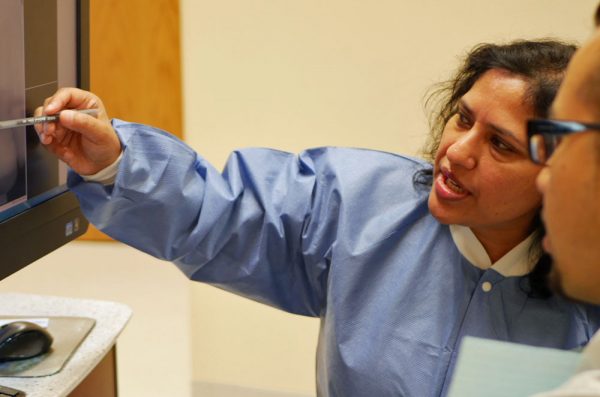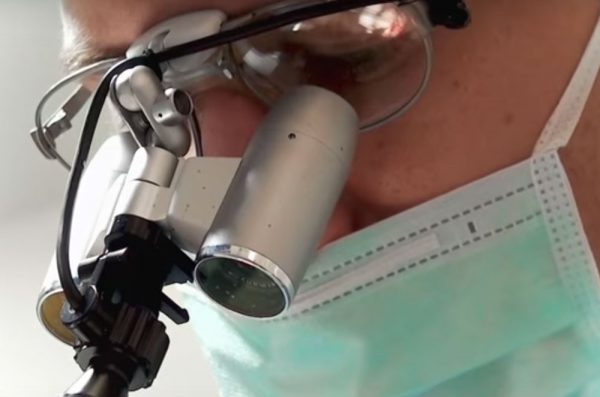Dentures and Implants: Solutions for Missing Teeth

Missing teeth or having problems with dentures?
Modern dental techniques provide alternatives to traditional dentures to replace missing teeth, including implant supported dentures.
Intro to Dentures and Implants
If you are missing teeth, you’re not alone. More than 35 million Americans do not have any teeth, and 178 million people in the U.S. are missing at least one tooth.
Most people want to replace missing teeth simply to regain their smile –and that’s a great reason. However, missing teeth can have a big impact on your life in a lot of ways. Spaces between your teeth may affect how you chew and eat, leading to nutritional and digestive issues. Even a single missing molar can affect how you chew. Without teeth to support the jaw structure, your facial features may start to look old and distorted, with sunken cheeks and skin wrinkling around the mouth. And, a lack of teeth can make it hard to talk.
While dentures are still a good option for many, modern dental techniques provide alternatives to traditional dentures to replace missing teeth, including implant supported dentures.
Options to Replace Teeth

At UIC College of Dentistry, we offer several options to replace some, or all of your missing teeth.
- Bridges. Anchored to your adjacent teeth, these can be removable or fixed, depending on your needs.
- Dentures (complete and partial). An option if you’ve lost all or most of your teeth.
- Implants and implant supported dentures. An alternative to traditional dentures growing in popularity.
General dentists and prosthodontists at UIC offer expert and affordable dental services to replace teeth and restore healthy smiles. Contact us today to reserve your evaluation visit.
Dentures and Bridges
The conventional method of replacing all of your teeth is with a complete denture. Dentures (also known as false teeth) are removable prosthetics designed to replace gaps caused by lost teeth. Dentures make it easier to eat and speak better than you could without teeth. Dentures also help the facial and jaw muscles to work properly so that you can eat, speak and smile normally. Dentures will help fill out the appearance of your face and profile if you’re missing most or all of your teeth.
Types of dentures:
- Conventional. This full removable denture is made and placed in your mouth after the remaining teeth are removed and tissues have healed, which may take several months.
- Immediate. This removable denture is inserted on the same day that the remaining teeth are removed. Your dentist will take measurements and make models of your jaw during a preliminary visit. You don’t have to be without teeth during the healing period, but may need to have the denture relined or remade after your jaw has healed.
- Overdenture. Sometimes some of your teeth can be saved to preserve your jawbone and provide stability and support for the denture. An overdenture fits over a small number of remaining natural teeth after they have been prepared by your dentist. Implants can serve the same function, too.
Implant Supported Dentures
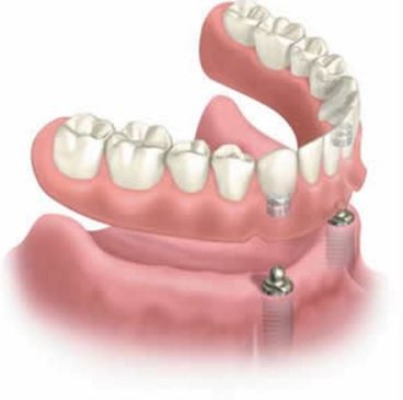
With continued denture use, the underlying bone changes and dentures slowly lose their fit. Eventually, so much bone loss can occur that a well fitting complete denture can no longer be made. Because of potential bone loss and improved comfort, implant supported dentures are a good way to replace missing teeth or to replace conventional dentures that no longer fit well.
Implants can help support dentures in both the upper and lower jaws. They are particularly beneficial for lower dentures. Almost every lower denture wearer would benefit from having two implants to support and retain the denture.
In addition to looking and functioning like natural teeth, implant-supported full bridges or dentures are designed to be long lasting. Implant-supported full bridges and dentures also are more comfortable and stable than conventional dentures, allowing you to retain a more natural biting and chewing capacity.
In addition, because implant-supported full bridges and dentures will replace some of your tooth roots, your bone is better preserved. With conventional dentures, the bone that previously surrounded the tooth roots begins to resorb (deteriorate). Dental implants integrate with your jawbone, helping to keep the bone healthy and intact.
In the long term, implants can be more esthetic and easier to maintain than conventional dentures. The loss of bone that accompanies conventional dentures leads to recession of the jawbone and a collapsed, unattractive smile. Conventional dentures make it difficult to eat certain foods.
Full-Mouth Implant Denture
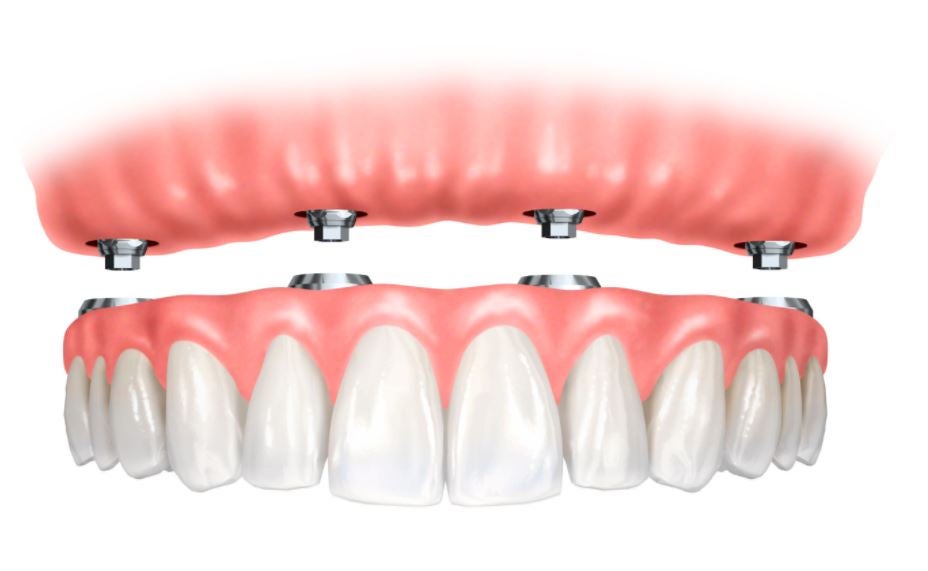
Full Mouth and All-On-Four Implant Dentures
If you are missing all of your teeth, or need a full arch top or bottom restoration, an implant-supported full bridge or full denture may be a great choice. We offer full mouth, full arch, and all-on-four implant denture restorations to replace natural teeth and restore your smile and facial aesthetics.
Implant-supported full implant dentures are more comfortable and stable than conventional dentures, allowing you to retain a more natural biting and chewing capacity. And because they will replace some of your tooth roots, your bone is better preserved.
Video: Implant Supported Dentures
Watch this video to learn more about implant supported dentures.
Video: Implant Supported Fixed Dentures (All-on-Four)
Watch this video to learn more about fixed implant supported dentures, or all-on-four technique.
Ready for an appointment?
UIC College of Dentistry provides expert, affordable denture implant options to replace missing teeth and restore healthy smiles.
General dentists and prosthodontists at UIC provide expert and affordable dental implant restorations. During the initial visit, we can provide an estimate of costs and time to complete the treatments.
